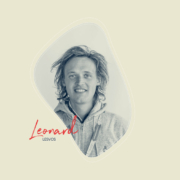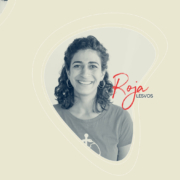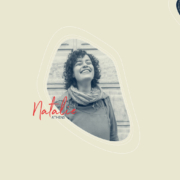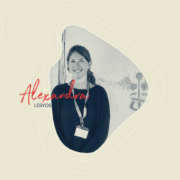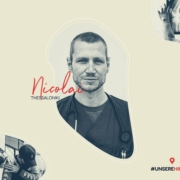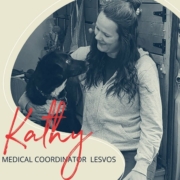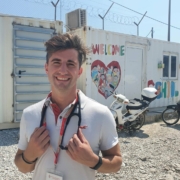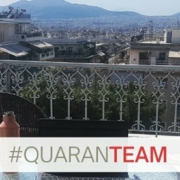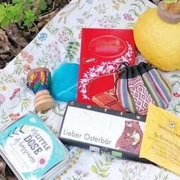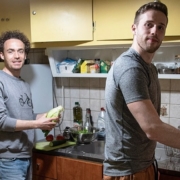1 year after the burning of Moria, there is hardly anymore attention for the people there. Asylum procedures have been accelerated – many refugees received a rejected asylum decision and are now on the Greek mainland or have disappeared. Due to the strict border controls of the coast guards and “illegal pushbacks” hardly any people arrive on Lesbos any longer. However, about 4000 people are still living in the new camp “Kara Tepe”, receiving general medical care from Medical Volunteers International. Amar Mardini, 31 years old, doctor, since the beginning of May with MVI on Lesvos reports about the current situation.
Please introduce yourself briefly.
My name is Amar Mardini, I am 31 years old and a doctor by profession. I completed my medical studies in Marburg and have since worked at the University Hospital there in the Department of Cardiology, Angiology and Internal Intensive Care Medicine.
How long have you been on Lesvos?
I have been here on Lesvos since May this year.
What is your job on the ground?
I am a doctor responsible for primary health care of the refugees in the camp, Kara Tepe, and I have also recently become the second medical coordinator of the Medical Volunteers international (MVI) on site.
You have probably prepared yourself for your assignment and also read up on it.
What surprised you when you arrived?
Since this is my first mission as a medical volunteer, I made a conscious decision to go to a place in Europe. During my training, I was primarily instructed in emergency and intensive care medicine at a German hospital. I was aware that this “high-end medicine” probably differs significantly from what is available locally. MVI sends an information guideline to each new volunteer before arrival, which gives you a rough idea of what to expect on the island. Once on the ground, however, you quickly discover that the challenges can be very demanding. The simplest diagnostic examinations and therapies are difficult here. So, to my astonishment, I had to realize at the beginning that the guidelines of “Doctors without Borders”, which were designed for crisis areas in developing countries, are being used in a European country.
What was your motivation to plan such a mission?
The issue of refugees, reasons for fleeing and migration has preoccupied me for several years. Then last year I read the book “The Shame of Europe: Of Refugees and Human Rights” by Jean Ziegler, Vice President of the Advisory Committee of the UN Human Rights Council. I was horrified by the circumstances described there on the Aegean island. People who fled hardship and misery and endured inhumane hardships during their journey found themselves, long before the fire in Moria, in an inhumane situation in the European Union.
The increasing acceptance of this situation in Europe stunned me. It contradicted my image of the European Union as a humanitarian community committed to universal and inalienable human rights and admired by so many people around the world. I wanted to help change something so that this narrative of Europe would not be found in later history books only as a hypocritical narrative. But there were also personal reasons. My father is originally from Syria. He emigrated to Germany decades before the civil war broke out. Although I myself, having been born and raised in Germany, have little connection with my father’s country of origin except for some wonderful childhood and youth memories during school vacations, I have probably experienced through my father a deeper and more personal insight into the suffering that this despicable civil war has been inflicting on my father’s relatives and acquaintances and the people on the ground and on the run for a decade now.
What does your “everyday life” look like here and how does it essentially differ from your work in Germany?
Whereas in my training at a German hospital all diagnostic and therapeutic options as well as interdisciplinary expertise were available at all times, here you have to go back to the basics of a medical examination and treatment. Anamnesis, physical examination and the simplest diagnostic tools are all that are available here. It is quite a challenge at first to get back to these basic examination and treatment methods. Despite the younger patient population compared to Germany, we see many patients every day due to the adverse conditions in which people live here. Abdominal pain, back pain, headaches, and communicable diseases such as scabies are common. The camp makes people sick, and not just physically. Many of the refugees need psychological support due to their experiences in their home countries, their journey or in the camp. Stories of torture, violence or sexual abuse are not uncommon. Symptoms of post-traumatic stress disorder, panic attacks and even psychogenic seizures are commonplace.
Despite this, as a volunteer it is also great to experience the international and interdisciplinary cooperation here. The stressful everyday life in a German emergency room is partly characterized by a dispute between the different departments. The tone between surgeons and internists can get very rough on some days. As MVI, we are responsible on site for primary health care and sometimes psychological care of the patients in the camp. We therefore have to work closely with all the medical players. Doctors and nurses from various countries of Europe, such as the United Kingdom, the Netherlands, Switzerland, Portugal and Greece, bring their diverse expertise to the international team. They work together hand in hand and always with an open ear for advice. It is enriching to see and discuss the partly different approaches of treatment. For me, it is a hopeful sign that the European community works and that we will find a solution together.
Are there any situations in dealing with patients that you especially remember?
Yes, it´s been a situation quite at the beginning of the mission. A young man from Sierra Leone came to see a doctor with a headache. A typical case in the camp, it is hot, water is rationed and people are under permanent stress. Medically not a challenging case and therefore actually quite quick to treat. However, since we were well staffed at the time, I was able to take my time with the patient. I asked him how old he was and when he arrived on Lesvos. He was 19 years old, all by himself and had only been on the island for a few days. There were very few people from Sierra Leone in the camp. He spoke English, which made me happy because we therefore did not need a translator to communicate with each other. However, in the camp, he found it difficult to connect in some cases due to the poor or lack of English skills of the refugees from other countries. At that moment, I thought about how it must be for a man who had just grown up to have to live in a camp with almost 8,000 unknown people. I started my medical studies in Marburg at the age of 19, and at that time of day I was probably sitting in a lecture at university, hungover, or still in bed after a long night with fellow students and new friends. When I asked him if he was already in contact with an NGO for legal aid, he answered “no”. I then showed him a paper with contact details of the various legal aid organizations and advised him to seek legal help as soon as possible, preferably on the same day. The young man, who at first listened very quietly and skeptically to my questions, gradually began to become more talkative. The headache seemed to have disappeared almost without a tablet by the end of our conversation. He thanked me at the end of our conversation. Since the beginning of him fleeing from his home country, he had received little help from strangers, he told me as he left the room. He followed my advice and even before his first interview with the authorities, he found an organization that advises him on legal assistance. He continues to drop by the clinic from time to time to tell me the latest about his case. The chances for a positive decision are not bad. He has only needed painkillers for headaches once.
How would you describe the current situation of refugees on the island?
As a doctor, I cannot give a complete overview of the current situation of the refugees. From a medical point of view, it is still a very precarious situation. Although they have arrived in Europe, it is not possible to treat them according to medical guidelines. They are second-class patients. In particular, due to the Covid 19 pandemic, we have few diagnostic tools at our disposal. The local hospital only allows emergency cases, patients wait several months for appointments with specialists. In some cases, even though the treating physician suspects a preventable cause of the disease and fears that by the time the specialists have clarified the situation, it will have deteriorated further or even become irreversible. However, to blame solely the Greek authorities is wrong. The health care system in Greece was already significantly strained before 2015 in the wake of the financial crisis. Caring for the thousands of refugees is not possible for a health system like this. International help is needed quickly on the ground with experts and specialists from the European community to change the situation of the refugees.
How has this changed since you arrived?
When I started my mission on Lesvos, there were just under 8,000 people in the camp. In the meantime, there are significantly fewer. For the remaining refugees, the situation has become more and more hopeless. Most of them have already received one or two rejections of their asylum applications, some even four. People’s desperation has increased. After a large wave of rejections and threats of deportation from official government authorities, we saw a significant increase in suicide attempts, some cases of extended suicide by desperate parents with children. Only a few refugees still manage to cross the dangerous waterway from Turkey to Greece. Due to the illegal and inhumane push-back methods, which can be easily tracked on social media like Facebook thanks to organizations like “Aegean Boat Report”, even arriving on the island is no longer a guarantee for a fair asylum procedure. Men, women and children, although they arrived in the European Union, are put back on rubber boats off the Turkish coast.
What can people in Germany do to support?
After the fire in the old camp “Moria” on Lesvos, there was a great willingness to donate. The situation on the Aegean island may have changed somewhat since the fire, but people have not simply disappeared. Tens of thousands of people remain stranded in Greece, without legal means for food or medical care. For many, NGOs working in Greece are the only way to get the basic necessities of life. It shouldn’t take another major tragedy to remind people back home of the dramatic situation on the ground.
What would you wish for? What should change here in Greece or in Europe?
First of all, the illegal and human rights violating push-back methods must end immediately. The problem of refugees and migration cannot be solved on a national level. The European Union must finally face up to its responsibilities. Throwing human rights, literally, overboard must not be the answer. The necessity to have so many non-governmental organizations within the European Union to maintain a minimum of human dignity is a disgrace for an international community like the European Union. Due to political pressure, it was possible to create a new border control organization in a very short time. It must therefore also be possible to create a European organization to maintain medical care at the borders of the Union. Financial support alone will not help countries like Spain, Italy or Greece to cope with the increasing human dramas taking place at our borders. It needs people with expertise on the ground. I am sure that numerous nurses and doctors would be willing to do this. They are already doing it voluntarily on their well-deserved vacations and with their saved money.
What do you think requires more attention?
It´s the individual stories of people who had to leave their countries. Through framing words like refugee crisis, the fate of the individual often disappears in a threatening-looking force of nature. Through the work in the clinic in the camp, especially through the numerous conversations with the translators with whom we spend several hours in a room every day, the differences of the supposedly foreign quickly disappear and the many similarities become apparent. Young men and women who studied before they had to leave their homes or earned their living as nurses or craftsmen and were in the process of building a life for themselves have now not only been deprived of their homeland. They have become prisoners within Europe, often without hope. In front of their eyes, the Europe they long for is so close, but it remains out of reach for most of the refugees. And looking back, the image of the burning homeland unfolds, which, due to current events, has not escaped even the international press.
Thanks very much, Amar, for the interview.

